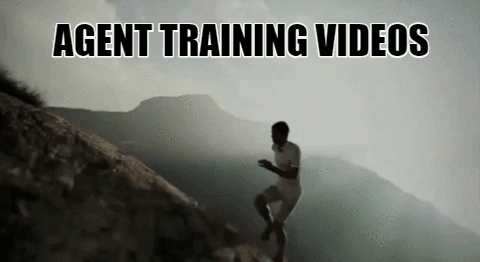5 Tips on How to Become a Successful Real Estate Agent 2018

While many people stress out over passing the real estate agent test, their focus is really on the wrong end of the problem. You’ll pass the test if you study. But if you don’t pay attention to the five items below, you will most likely join the large group of agents who fail to make it in the business because they don’t plan ahead.
1. Have a Backup Income Source
Real Estate IS NOT get rich quick. If you are newly licensed, you are probably about 4 to 6 months away from getting a check. This is a harsh reality, but true. Now don’t get me wrong, we have plenty of success stories where our agents have been able to open an escrow in their first 30 days of working with our firm, but remember, most escrows take between 45 to 60 days to close, so if you’re paying attention, that’s about 90 days to wait for your first commission check. This isn’t all bad considering the cost of real estate today, but you have to understand the way our profession is paid.
You should have enough money saved up to make it for at least six months without a commission or you’re going to need keep your day job for a while. Becoming a part time real estate agent may not have been your plan, but you need to have the ability to pay your bills while you get started. Unless you have some family members or friends ready to buy a home, you can go for many months without an income. The majority of agents who fail do so in their first or second year in the business.
I know firsthand what it is like to supplement your income while you’re building your real estate business. I’ve only had one job in my life: a patient registration clerk at Pacific Alliance Medical Center, which ironically was the hos
pital I was born in, back when it was known as the French Hospital of Los Angeles. It was a graveyard job. I’d work from 10 PM to 6 AM registering patients and verifying insurance coverage. Then I’d rush to my UCLA dorm room and sleep until noon so that I could go to my classes until about 4 pm. Then from 4 pm until about 8 pm I would work as a Real Estate Agent. It wasn’t easy, but I did it. You are going to have to make some sacrifices in the pursuit of your dream.
2. Get a Mentor or Choose a Broker With Good Training

Get a Mentor or Choose a Broker With Good Training
The very first thing you need to do is to identify a mentor. Everyone NEEDS a mentor. I don’t care who you are. Warren Buffet’s mentor was Benjamin “Ben Graham” the father of “Value investing.” Michael Jordan’s mentor was Dean Smith, one of the winningest basketball coaches of all time. You can succeed on your own without a mentor, but why would you want to?
Having a mentor isn’t required, but one huge benefit is the ability to earn as you learn. During the initial “iOF” phase, it’s important to stay focused on what will fuel your success, and success in our profession is defined as sales and the only way to sell is through lead generation which means you are going to have to either talk to a lot of people or spend a lot of money advertising and/or buying leads.
While you focus on lead generation, you will need someone to help you review contracts, negotiate, and yes-add credibility. Excitement is attractive, and even engaging, but to have someone trust you with the largest asset of their life, will require a little more than just you being enthusiastic about serving them. This is another reason that a mentor adds value to the equation.
Your friends and family know you. They know about your successes. They know about your failures. They even know about some of the more embarrassing events in your life that you probably wish they’d stop reminding you about. The truth is, you don’t have much experience selling real estate yet-and that’s nothing to be ashamed of. Every person and every company has their first day. It’s just that your friends and family don’t want to be your guinea pig. So the best way to overcome the reality or perception that you are new to the profession, is to shift their microscopic scrutiny of you and redirect it onto someone with more experience and a more robust resume so that you don’t ever have to hear, “Well (insert your name here), we like you and trust you, but we just aren’t comfortable with your level of experience.”
When you use a mentor who has a track record it eliminates the objection that you don’t know what you are doing. You act as the “opener,” and your job is to enthusiastically build up the credibility of your mentor. If you do this correctly, it is your relationship and their trust and confidence in you that will open the conversation and it is your mentor’s skill and ability that will secure their business. I’ve used this tool many times in life as a mentee and as a mentor. Trust me. It works.
3. Start Building Your “Book of Business”
Some call it working your sphere of influence, or your center of influence. Essentially this means approaching everyone who knows you, likes you, and trusts you, about your newfound profession. If you’ve ever started a business, such as a restaurant, the first few people you invite as guests are people you know. Why? Because you’re excited and want to share your latest endeavor with the people you love (and anyone who will listen). It comes natural. But for some reason, when people join our ranks, they’re afraid of speaking to people they know in fear of imposing. They turn into Ninja Agents. This is quite possibly one of the worst and most counterintuitive ways of launching your business.
If you’ve ever owned a business, say a restaurant, you know that you have two types of openings. A soft “test run” opening where you work out the kinks. Typically this is where you invite friends & family. Once you’ve got a handle on things, the next step is to have a Grand Opening. Real Estate should be no different. Your message has a better chance of being heard when it’s shared with people who already know you. I recorded a video training on how to tactfully engage your sphere of influence. You may also consider reviewing the real estate agent training slides accompanying it.
Your center of influence will grow and there will be no shortage of contacts with which you will interact with during a transaction. Becoming a real estate agent is just the very first step in a long (you hope) career of working with buyers, sellers, investors, appraisers, loan officers, mortgage brokers, inspectors, title companies and others. Each person you come into contact with is an opportunity to share what you do, AFTER you’ve earned the right to ask for their business.
4. Start Out Right With Technology and the Internet

Start Out Right With Technology and the Internet
No matter what some of the “old-timers” may tell you, you NEED the Internet to market in today’s real estate world. While some with many years in the business can continue to succeed due to referrals and past business over the years, you’ll need to use your website and social networking to get a foothold with today’s buyers and sellers. Budget for a good web presence, though it need not be expensive. Most real estate agent websites suck. In a separate blog entry I share precisely what you need to do to get your site ranked on Google.
Use as many free tools available to promote your brand that you possibly can, particularly social media. You’ve got to build what I call a social fortress. That means that at bare minimum your business must have a profile on Google Maps, Apple Maps, Yelp, LinkedIn, Facebook Business, Twitter, Instagram, Snapchat, YouTube and Pinterest. Many of these platforms, allow you to not only share original content you create, but sites like LinkedIn and Medium allow you to write your own articles that are often picked up quicker by search engines than blog content from your own personal website. The best part is that all these tools don’t cost you anything it your time.
5. Becoming a Real Estate Agent Isn’t Just Getting a License
For most would-be real estate agents, the courses and the test for licensing turn out to be less fearful than they anticipated. The rude awakening comes later when they don’t find that easy income in the first couple or three months. They thought they had a family member or friend all lined up, but they are taking their time, not buying or listing when the new agent thought they would.
Having a plan, some money saved, or another income will smooth your entry into this competitive business.
Budget for several months without any income, perhaps six or more in some cases. Budget for enough money to begin a website and online strategy to build business down the line. However, lots of contacting of people, and beginning your prospects list by the old methods will help you to get started while the slower online process builds. You can call, mail and email every person you know, and you just may pull a deal out of the hat sooner than expected. This will keep you in the game while you build your marketing efforts and business.
Learn from peers, your mentor or your broker about all of the important documents involved. Try to avoid being asked basic buyer or seller questions you can’t answer, as it could cost you the prospect. Either ask for past transaction folders and study the documents or ask to assist an experienced agent in their next transaction.
There’s no substitute for actual deal experience.
The real estate business can be fun, exciting and a very satisfying career. However, you have to make it through that first year or two to make it all happen down the road. Have a plan, build a database of prospects, and work hard to find the keys to success at becoming a real estate agent.
See you over the top!
– Paul











